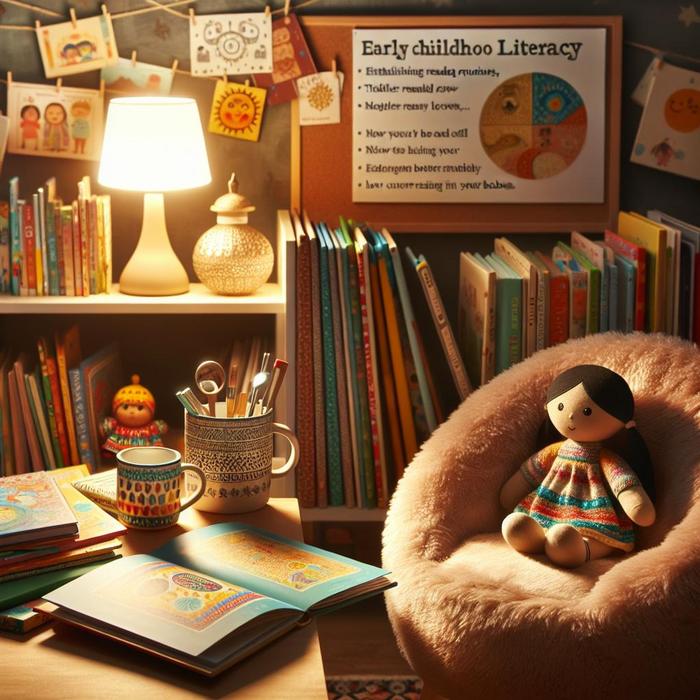Building an Early Literacy Foundation
As a parent, it is essential to begin building your child’s foundation for reading from an early age. Introducing books to your baby not only enhances their learning abilities but also fosters a lifelong love for reading. What’s more, it can be an exceptional bonding activity between you and your little one. In this post, we will delve deep into early literacy tips, recommend the best books for babies, and discuss how to establish effective reading routines. Let’s get started!
Emphasizing Reading’s Value from Day-One
It’s never too early to introduce your baby to the magical world of books. Many studies, like those mentioned in this article on Voyager Sopris, illustrate the significant positive impact of early literacy on a child’s cognitive, social, and emotional development. Therefore, as parents, we have to ensure our little ones get the best start in their reading journey. Here’s how to make the introduction:
- Start reading aloud: From their first day at home, make reading aloud a regular routine. Your baby may not understand the words, but they will enjoy hearing your voice and connecting it with the joy of books.
- Choose age-appropriate books: Opt for brightly colored board books with simple illustrations and text. These will catch the baby’s attention and stimulate their developing vision.
- Use a playful tone: Modulate your voice and enact the characters in the book. This will make reading sessions engaging and fun for your child.
Our Favorite Reads for Babies
With a plethora of children’s books available, choosing the best books for babies might seem overwhelming. To help you out, here are our top picks:
- “Goodnight Moon” by Margaret Wise Brown: This routine-based classic is a soothing bedtime story for your little one.
- “Brown Bear, Brown Bear, What Do You See?” by Bill Martin Jr: This book is perfect for introducing colors and animals to your child.
- “The Very Hungry Caterpillar” by Eric Carle: This book helps your kid learn about colors, days of the week, and food, all while following the journey of a cute caterpillar.
A detailed list of our favorite reads can be found in this Early Literacy Collection.
Establishing Effective Reading Routines
Consistency is key when encouraging reading habits in your child. Here’s how you can create an effective reading routine:
- Set a specific reading time: Whether it’s bedtime or after lunch, establish a consistent reading time. This will give your child something to look forward to each day.
- Create a reading space: Choose a comfortable spot in your house and make it your designated reading area.
- Stay patient: Your baby might get restless or lose interest during the reading session. Don’t push them. The goal is to make reading enjoyable, not forced.
In addition to the above, remember to make use of other resources like this enjoyable piece on Reading Partners that mentions the beautiful bond between a mother and child while reading.
Why Reading is Integral to a Child’s Development
Reading to your child from an early age is a crucial factor in their overall development. It is in the first years of a child’s life that the pace of brain development is at its peak. Reading not only serves as an effective stimulus for this growth, but it also helps in developing cognitive skills, nurturing social-emotional abilities, and cultivating a profound love for language. This Booksource article provides empirical evidence on how early literacy proves essential in shaping a child’s academic success and later life skills.
On another note, the simple act of sitting down for a reading session with your child creates a unique bond, fostering their sense of security, enhancing bonding, and ultimately leading to better emotional intelligence.
Nurturing a Love for Reading
Developing a love for reading in your child extends beyond the direct cognitive benefits. It opens up a whole new world for them, helps expand their vocabulary, and develops their imagination. It’s crucial not to force the activity, rather make it an enjoyable experience to instill a lifelong love for books and reading in them. Here’s how:
- Make it Interactive: Encourage your child to turn the pages or point at the pictures. Asking questions about the story or illustrations also enhances their involvement and comprehension skills.
- Read Books that Align with their Interest: If your child loves animals, go for books with animal characters or stories revolving around animals. Aligning books with their interests will make them eager for the reading sessions.
- Make Reading a Family Affair: Make reading sessions a family time where everyone in the family comes together with their books, creating an environment that fosters group reading.
This article from PennState Extension offers more tips on promoting early literacy.
Upgrading Reading Materials as your Child Grows
As your child grows and develops comprehension skills, enhance their reading material by introducing picture books with more text, easy-to-read books, and ultimately children’s novels. This progression will not only keep their interest intact but also challenge their literacy skills, leading to continuous growth and development. The Jbrary article offers more insights on escalating reading materials as per your child’s developmental stage.
Role of Schools and Teachers in Early Literacy
While parents play a crucial role in early literacy, so do teachers. Schools should adopt a comprehensive literacy program that embraces diverse methodologies to cater to the different learning styles of children. Building a well-stocked classroom library, involving parents, and utilizing various tools and techniques to make reading fun for the students such as dramatizing stories, rhymes, or songs are some effective approaches. This American Federation of Teachers article shines light on the role of teachers in early literacy.
In conclusion, establishing a strong literacy foundation from an early age has multifold benefits. It’s more than about merely reading. It’s about empowering our children, developing their skills and personalities, nurturing a deep love for words, stories and knowledge, and ultimately preparing them for academic success and adulthood.
